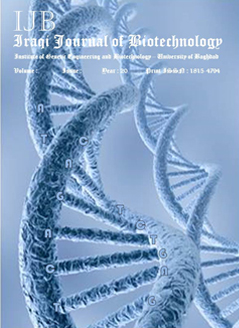Assessment of DNA damage in peripheral blood lymphocytes of workers occupationally exposed to low levels of ionizing radiation in Al-Amal hospital for cancer in Baghdad.
Abstract
The present study aims to use the cytogenetic analysis as a biomarkers of professionals occupationally exposed to ionizing radiation in Al-amal National Hospital for cancer Management in Baghdad –Iraq, This study was carried out on Thirty Iraqi radiation workers exposed to a low dose of ionizing radiation, included twelve females and eighteen males between the ages of (22-57) years, as well as Twenty apparently healthy individuals collected randomly from population living Baghdad , aged (19 - 55) years which are non-smokers non- alcoholic as control group . The cytogenetic analysis including, chromosomal aberrations in lymphocytes, as fragment, ring and dicentric chromosomes also chromatid aberration , Micronuclei MN frequency, nuclear division index and mitotic index were performed on peripheral blood lymphocytes for workers and control group. The present study showed significant increase (p<0.05) in the chromosomal aberration for the worker as compared with the control group. Also there were found significant increase (p<0.05) in Micronuclei MN frequency in nucleated lymphocytes and nuclear division index for the worker as compared with the control group. While it was no significant differences in nuclear division index between worker and control group. Also there were found a significant increase (p<0.05) in comet tail length and tail moment values in the human lymphocyte in these radiation worker of studies as compared with the control group. The present study showes that the increase of chromosomal aberration and Micronuclei frequency, in hospital workers due to exposed to a low dose of ionizing radiation than in the controls. In conclusion, the results indicated that there is a possibility of using the changes in the chromosome aberration and micronuclei in human lymphocytes are as a useful as biodosimetric markers for the detection of human exposure to ionizing radiation. Also, the results obtained confirmed usefulness of the alkaline comet assay as a sensitive additional biomarker in the regular health screening of workers occupationally exposed to low doses of ionizing radiation. The current results of unstable chromosome aberration within of normal values according of the technical report of International Atomic Energy Agency (IAEA) No. 405, 2001.


